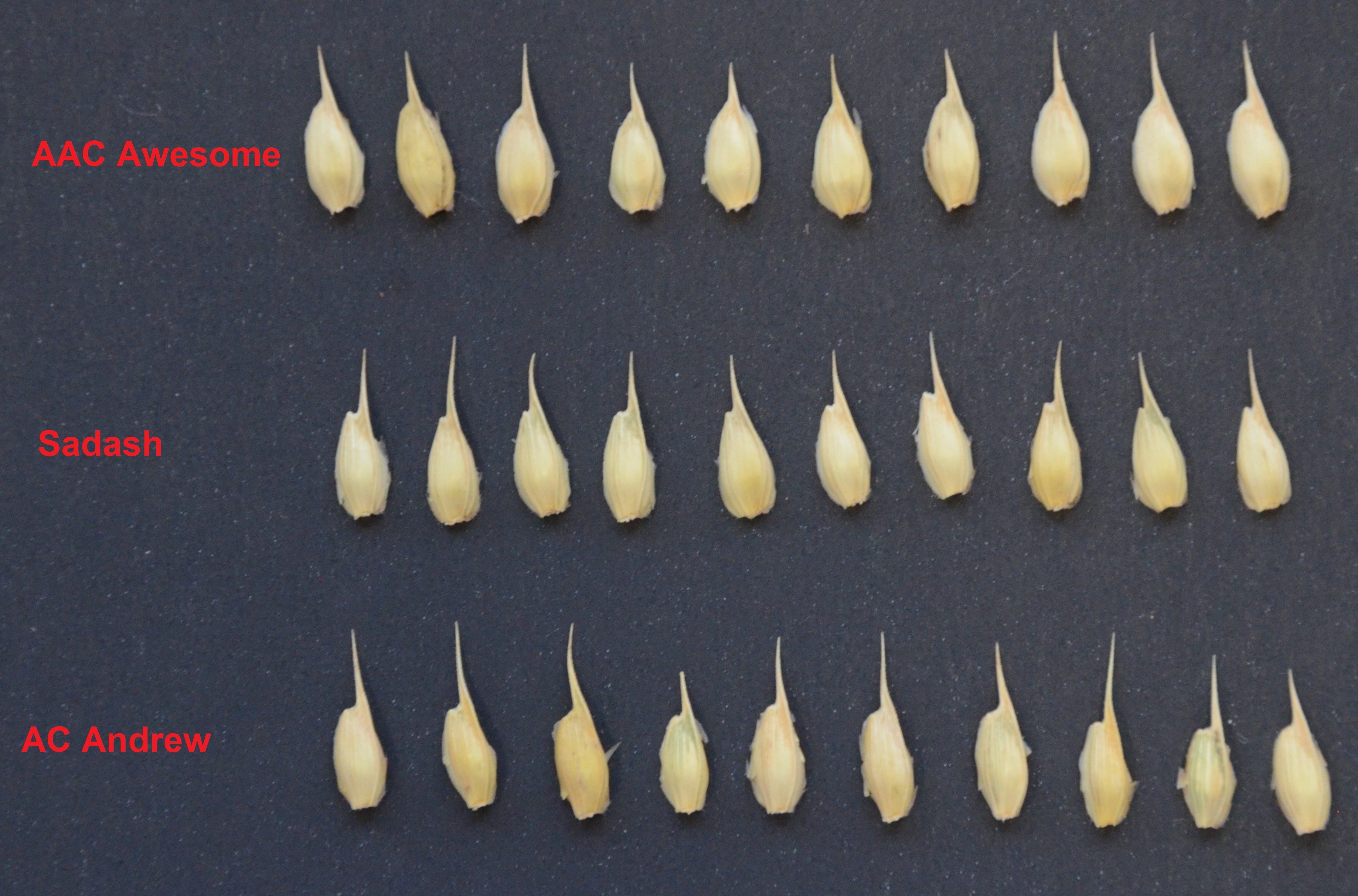AAC Awesome
| Denomination: | 'AAC Awesome' |
|---|---|
| Botanical Name: | Triticum aestivum |
| Applicant/Holder: |
Agriculture & Agri-Food Canada, Lethbridge Lethbridge Research Centre, 5403 - 1 Avenue, South P.O. Box 3000 Lethbridge, Alberta T1J 4B1 Canada |
| Breeder: |
Harpinder S. Randhawa, Agriculture & Agri-Food Canada, Lethbridge, Alberta |
| Agent in Canada: |
Agriculture & Agri-Food Canada Office of Intellectual Property and Commercialization c/o Shannon Whyte 107 Science Place Saskatoon, Saskatchewan S7N 0X2 Canada Tel: (204) 999-9887 |
| Application Date: | 2016-04-22 |
| Provisional Protection:: | 2016-04-22 |
| Application Number: | 16-8899 |
| Grant of Rights Date: | 2018-05-11 |
| Certificate Number: | 5730 |
| Grant of Rights Termination Date: | 2038-05-11 |
Variety Description
Varieties used for comparison: 'Sadash' and 'AC Andrew'
Summary: 'AAC Awesome' has a semi-erect growth habit while it is erect in both reference varieties. The frequency of plants with recurved flag leaves on 'AAC Awesome' is medium whereas the frequency is high in both reference varieties. The spike glaucosity of 'AAC Awesome' is strong while it is weak for 'AC Andrew'. The neck of the culm of 'AAC Awesome' has medium glaucosity whereas the glaucosity is strong on 'Sadash' and weak on 'AC Andrew'. The spike of 'AAC Awesome' is longer than that of 'Sadash'. The shoulder shape of the lower glume of 'AAC Awesome' is sloping whereas it is elevated for 'Sadash' and it is straight for 'AC Andrew'. 'AAC Awesome' has a greater thousand kernel weight than both reference varieties. The shape of the germ of 'AAC Awesome' is broad elliptic whereas it is round for both reference varieties.
Description:
PLANT: soft white spring type, semi-erect growth habit at the 5-9 tiller stage, matures mid-season
SEEDLING (4 LEAF STAGE): absent or very weak anthocyanin colouration of the coleoptile, glabrous sheath and blade of lower leaves
FLAG LEAF: medium frequency of plants with recurved flag leaves, strong glaucosity of sheath, glabrous blade and sheath, absent or very weak glaucosity of lower side of leaf blade, absent or very weak anthocyanin colouration of the auricles
CULM: absent or very sparse hairiness of uppermost node, medium glaucosity, straight neck
STRAW: no anthocyanin colouration at maturity, medium thickness of pith in cross-section
SPIKE : strong glaucosity at heading, tapering shape in profile, dense, white at maturity, inclined attitude, absent or very sparse hairiness of convex surface of apical rachis segment
AWNS: shorter than spike length, white at maturity
LOWER GLUME: ovoid, medium length and width, glabrous, sparse extent of internal hairs
LOWER GLUME SHOULDER: narrow, sloping shape
LOWER GLUME BEAK: straight, medium length
LOWEST LEMMA: straight beak
KERNEL: white, medium sized, medium length and width, oval, rounded cheek, medium length of brush hairs, medium width and depth of crease
GERM: medium sized, broad elliptical in shape
AGRONOMIC CHARACTERISTICS: good resistance to shattering
DISEASE REACTIONS: moderately resistant to Leaf rust (Puccinia recondita), Stem rust (Puccinia graminis f. sp. tritici) and Stripe rust (Puccinia striiformis), moderately susceptible to Black point (Alternaria species) and Fusarium head blight (Fusarium graminearum, Fusarium species), susceptible to Loose smut (Ustilago tritici)
INSECT REACTION: resistant to Wheat Midge (Sitodiplosis mosellana)
Origin & Breeding History: 'AAC Awesome' (experimental designation GP151) was developed from the cross 93FHB37 / 2*Andrew // SWS366 (L06015) made at the Agriculture and Agri-Food Canada Lethbridge Research Centre, Lethbridge, Alberta in 2006. F2, F4, F6 and F8 plants were grown in various locations in New Zealand (Leeston and Lincoln). F3 heads were selected from bulk plots and were grown in Lethbridge and Vauxhall, Alberta. Further selection was also done on the F5 generations based on plant type, rust resistance, seed colour, seed type and freedom from Black point. In 2010, one row was selected and planted in a replicated yield trial in Lethbridge, Alberta and in disease nurseries. Based on agronomic performance, it was advanced to A level test at three locations in Alberta in 2011 as 11A-204. GP151 was entered in the General Purpose Spring Wheat Cooperative Registration trial from 2013 to 2015.
Tests & Trials: Trials for 'AAC Awesome' were conducted during the summers of 2015 and 2016 at Fairfield Farm in Lethbridge, Alberta. Plots that were 2.76 squared metres consisted of 4 rows with a row spacing of 23 cm and a row length of 3 metres. There were 3 replications arranged in an RCB design with 250 plants per square metre and 700 plants per plot.
Comparison tables for 'AAC Awesome' with reference varieties 'Sadash' and 'AC Andrew'
Spike length, excluding awns (cm)
| 'AAC Awesome' | 'Sadash' | 'AC Andrew' | |
|---|---|---|---|
| mean (2015) | 10.9 | 9.5 | 11.1 |
| std. deviation (2015) | 0.8 | 0.54 | 0.61 |
| mean (2016) | 7.8 | 6.1 | 6.9 |
| std. deviation (2016) | 0.9 | 0.8 | 0.9 |
Kernel weight (grams per 1000 kernels)
| 'AAC Awesome' | 'Sadash' | 'AC Andrew' | |
|---|---|---|---|
| mean (2015) | 38.4 | 32.9 | 33.9 |
| std. deviation (2015) | 0.49 | 0.42 | 0.93 |
| mean (2016) | 37.8 | 32.3 | 30.6 |
| std. deviation (2016) | 1.0 | 1.3 | 1.2 |
Click on image for larger view

Wheat: 'AAC Awesome' (top) with reference varieties 'Sadash' (centre) and 'AC Andrew' (bottom)
- Date modified: